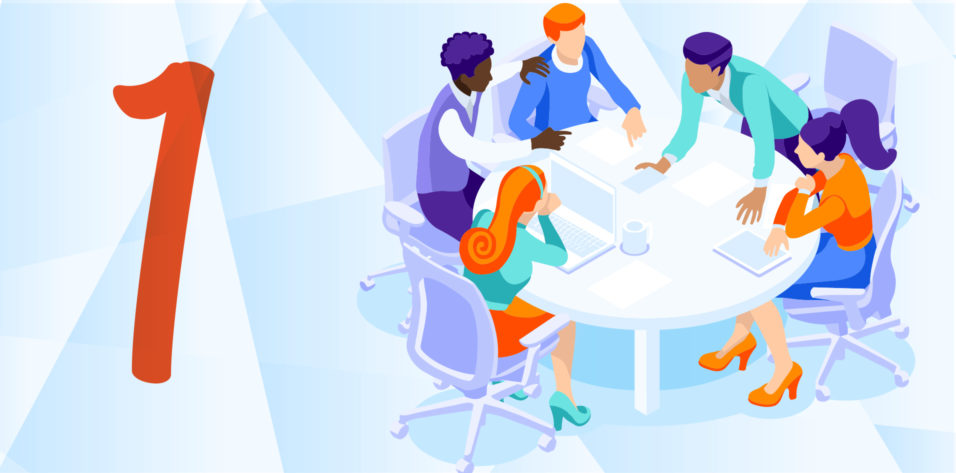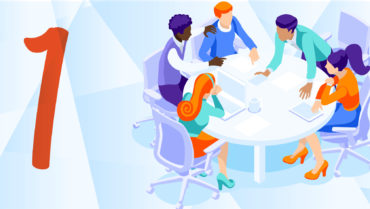The phrase be an ally has become a part of the current lexicon, but what does it truly mean? Why is allyship essential to creating a better and more equitable future? Before exploring the importance of allyship, it is helpful to first consider its definition(s). The Merriam-Webster Dictionary defines allyship as “the state or condition of being an ally; supportive association with another person or group.” The concept of allyship in 2021, however, is not passive, except in the circumstance of performative allyship. Effective allyship reflects a range of actions or activities that reach beyond simple support.
Being an ally, or the process of allyship, helps to achieve equity and inclusion. Allyship helps to improve the culture and climate of a workplace or an educational institution and ensures that all voices are welcome, respected, and heard. In general, the term allyship is used to describe the path by which individual members who identify as belonging to a majority group or an in-group use their privileges to help advance the opportunities of individuals or groups who identify as being part of a minority or marginalized group.1 Thus, allyship disrupts prejudice and discrimination inclusive of gender, gender identity, ableism, race, ethnicity, religion, age, and national origin, among other factors. Allyship advances opportunities.
Extensive opinions and articles have been published to describe the different components of allyship. I believe that it is helpful to focus on select elements, including the impact of personal education, the acknowledgement and ownership of privilege, the expansion of one’s networks, the honing of active listening skills, the respectful confrontation of wrongs, and sponsorship in addition to mentorship. It is also important to recognize that allyship is a lifelong process and commitment, not a one-time “I checked that box” event.
PERSONAL EDUCATION
A critical aspect of allyship is a commitment to learning and personal education. Understanding our own identities allows us to make a commitment to learning. Who are we? Each of us carries within us personal identities that encompass aspects that are outwardly visible and inwardly hidden. These identities affect how we see the world and ourselves in it.
ACKNOWLEDGEMENT AND OWNERSHIP OF PRIVILEGE
Once we understand who we are, we can begin to acknowledge and own our privilege(s). Our privilege is not simply our socioeconomic status or skin color but rather how our many attributes and identities affect our daily lives and the experiences we have.2 Acknowledging privilege involves answering questions and undergoing a process of deep reflection. For example, what does it mean if, when we walk into a patient’s room or a meeting of peers, our expertise is questioned because of our outward-facing identity or no one in the meeting outwardly reflects one of our identities?
It may be helpful to use one of the many instruments available online to better understand and reflect on one’s privilege.
NETWORK EXPANSION
Most of us spend time with friends, colleagues, and collaborators, but surveys indicate that many of these individuals share similarities with our own identities. People are known to favor their own in-groups. Intentional expansion of one’s networks is an important component of becoming an ally. Spending time with people who are different from us expands our horizon and can decrease the hidden biases that each of us carries. Having a diverse network of collaborators also improves the questions we ask or the paths to solving challenges.
ACTIVE LISTENING
Having a network alone is insufficient; we must also hone and advance our active listening skills. We must strive to hear the concerns, experiences, and expertise of our colleagues and then be humble enough to respond through active inquiry to learn more.
RESPECTFUL CONFRONTATION
What is our response when we witness or learn about an event that creates trauma or harm to individuals because of their specific identities? Microaggressions are everyday slights, put-downs, and insults that are experienced too often by individuals from marginalized groups.3 Microaggressions can cause long-term harm. As an ally, we have a responsibility to speak up when they occur.
Whether the individual meant to create discomfort or harm may be in question. Whether or not the action was intentional, the most important next step is to recognize the harmful impact and respond. Intervention requires confronting the wrong; providing support, if desired, to the individual(s) who were targets of the initial action; and helping to address or educate the individual who initiated the event. To be effective, we should never assume how the target of the action felt; instead, we act because we recognize the action as inappropriate or worse. It is important to learn how to recognize and effectively respond to microaggressions and other inequities, including, but not limited to, policy, public statements, and opportunities for advancement. We can also speak up by promoting inclusion. For example, we can point out when a lack of representation exists on committees or in speaking roles at meetings.
SPONSORSHIP
Most of us physicians are well aware of the importance of mentorship. In addition to being an effective mentor, it is crucial that we use our privilege to be a successful sponsor. Sponsors use their expertise, status within an organization, connections or networks, and prior successes to help promote the careers of others and provide them with opportunities.4 Allies use these opportunities to sponsor individuals who may be marginalized and who may be overlooked for academic advancement, research collaborations, recognition and awards, and speaking engagements. Sponsors recognize the excellence in others, and sponsors use their own privilege to enhance the success of others.
CONCLUSION
It has always been important to be an ally, but the events of 2020 have increased the urgency of allyship. The COVID-19 pandemic raised public awareness of the health care disparities that were previously known to many of us but became front-page news. Racial injustices were also more exposed, leading to increased activism to address social and societal justice. Increasing allyship in 2021 will help to address these crucial issues and help us heal our future by increasing equity.
1. Zhuo L, Ju V, Wakam G, Antunez A, Dossett LA. Facilitators and barriers to allyship in academic surgery: a qualitative study. Am J Surg. 2020;S0002-9610(20):30572-30579.
2. McIntosh P. White privilege: unpacking the invisible knapsack. In: Plous S, ed. Understanding Prejudice and Discrimination. McGraw-Hill; 2003:191-196.
3. Torres MB, Salles A, Cochran A. Recognizing and reacting to microaggressions in medicine and surgery. JAMA Surg. 2019;154(9):868-872.
4. Ayyala MS, Skarupski K, Bodurtha JN, et al. Mentorship is not enough: exploring sponsorship and its role in career advancement in academic medicine. Acad Med. 2019;94(1):94-100.



